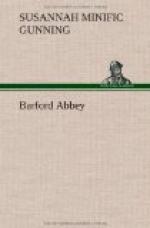She pronounced travellers with uncommon glee;—at least I thought so,—and, nettled at her indifference, could not help replying, You are very happy, madam;—you part with your friends very unreluctantly, I perceive.
If any thing ever appeared in my favour, it was now.—Her confusion was visible;—even Edmund observed it, who just then strolled towards us, and said, looking at both attentively, What is the matter with Miss Warley?
With me, Edmund? she retorted,—nothing ails me.—I suppose you think I am enough of the fine lady to complain the whole day, because I have got up an hour before my usual time.
His tongue was now silent;—his eyes full of enquiries.—He fixed them on us alternately,—wanting to discover the situation of our hearts.—Why so curious, Edmund?—Things cannot go on long at this rate.—Your heart must undergo a strict scrutiny before I shall know what terms we are upon.
No words can paint my gratitude for worthy Jenkings.—He went to the Abbey, on foot, before breakfast was ended, to give me an opportunity of supplying his place in the chaise.—At parting he actually took one of my hands, joined it with Miss Warley’s, and I could perceive petitions ascending from the seat of purity.—I know to what they tended.—I felt, I saw them.—The chaise drove off. I could have blessed him.—May my blessings overtake him!—May they light where virtue sits enshrin’d by locks of silver.
Yes, if his son was to wound me in the tenderest part, for the sake of such a father, I think,—I know not what to think.—Living in such suspence is next to madness.
She treats him with the freedom of a sister.—She calls him Edmund,—leans on his arm, and suffers him to take her hand.—The least favour conferred on me is with an air so reserved, so distant, as if she would say, I have not for you the least sentiment of tenderness.
Lady Powis sends to desire I will walk with her.—A sweet companion am I for a person in low spirits!—That her’s are not high is evident.—She has shed many tears this morning at parting with Miss Warley.




